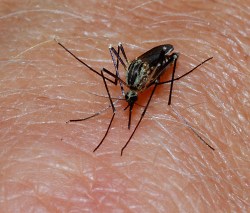
Honestly, how anyone could not want to kill this thing is beyond me.
Last week, Dallas declared a state of emergency after the city’s ninth West Nile death in 2012. Today, that number stands at 16.
As we noted then, West Nile is now present in each of the lower 48 states. As the Guardian notes, 43 states have so far this year reported people, birds, or mosquitoes infected with the virus. But no place is as affected as Dallas.
“Right now, Texas has half the West Nile cases in the nation,” Dr David Lakey, the Texas state health commissioner, told local reporters this week. “Dallas County has half of the cases in the state of Texas. So, about a quarter of all the cases in the United States are in this county. So, this isn’t business as usual.”
According to Texas department of state health services figures, 381 West Nile cases have been confirmed in Texas this year, including 16 related deaths – on track for the most cases since the disease first reached the state a decade ago.
The state’s solution is simple, but controversial. Tomorrow night, twin-engine planes will fly over the county, releasing a pesticide called Duet.
Residents are understandably nervous, but local media outlets have put out story after story after story noting that such efforts have not caused notable problems in other areas.
Let me add a story of my own. For more than 10 years (that article is from 2001), New York City has similarly been spraying for mosquitoes in an effort to tamp down West Nile. The insecticide being used in Dallas, Duet, contains the same active ingredients as Anvil, the one used this year in New York City — a city nearly seven times as large. According to the city Department of Health, there has been only one West Nile case reported in New York City this year; the person recovered.
(And if you’re curious about, say, cancer over that time? Rates in New York City have steadily declined since 2001 — though that’s likely due to a drop in smoking.)
Spraying these types of pesticides is not completely without risk, of course, as the New York State Department of Health notes — but those risks appear to be small.
There are no studies examining whether the use of Anvil to control mosquitoes has caused any long-term health effects in humans.
Anvil is applied at very low concentrations to control mosquitoes. It is unlikely that adverse health effects will occur as a result of this use for most people, but some individuals may experience health effects.
I understand that people in Texas are often loathe to accept advice from the residents of New York, but, come on. We’re only talking about public health here, not something important like salsa.



